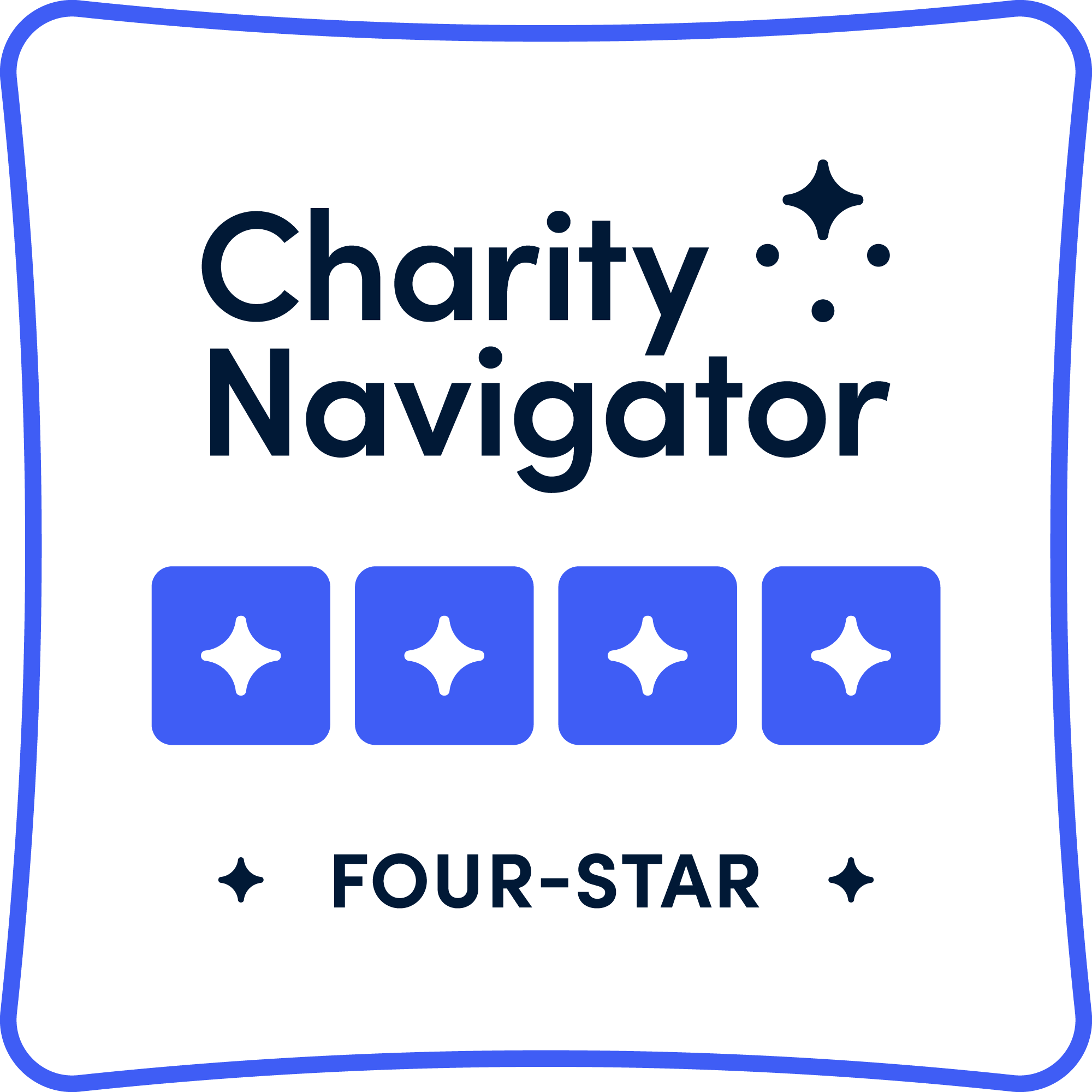Below is the Esteemed list of Speakers at our 2024 Global Summit and Award Ceremonies for Cancer Research & Entrepreneurship!
Listed in order of apperance

Dr. Sujuan Ba has served as President & CEO of the National Foundation for Cancer Research (NFCR) since 2019 and is the founder & CEO of the Asian Fund for Cancer Research since 2005. She is also a co-founder and founding board member of the Global Coalition for Adaptive Research (GCAR), which pioneers adaptive clinical trial platforms to deliver innovative therapies to patients faster. Additionally, Dr. Ba is the CEO & Co-founder of the AIM-HI Accelerator Fund, a non-profit focused on advancing oncology start-ups through venture and impact investments. She serves as a scientific advisor and board member for over half a dozen oncology start-ups.
Dr. Ba has been active in the Women in Science Committee of the Controlled Release Society (CRS) since 2017 and is a member of Springboard’s Life Science Council. She was the President of the Chinese Biopharmaceutical Association (2010-2011) and is a lifetime member of BayHelix, a global organization of life sciences leaders of Chinese origin.
Under her leadership, NFCR established the prestigious Szent-Györgyi Prize for Progress in Cancer Research, where she has co-chaired the Prize Selection Committee since 2006. In 2020, she launched the AIM-HI Women’s Venture Competition, supporting over 150 women-led oncology start-ups.
Dr. Ba has received numerous accolades, including being named one of the “20 Most Inspiring Women Leaders 2022” by The Women Leaders Magazine and one of the “Top 300 Women Leaders in Global Health” in 2015. She holds a BS in radiochemistry from Peking University and a Ph.D. in chemistry from the University of Pennsylvania.
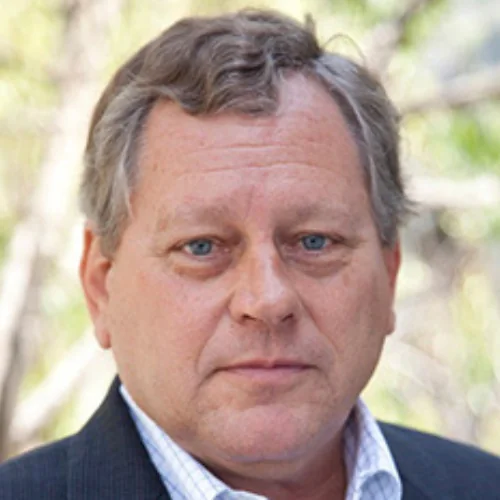
Dr. Cavenee completed his graduate and postdoctoral training in cell biology, biochemistry, and human genetics. He earned his Ph.D. with honors in 1977 from the University of Kansas Medical School, followed by postdoctoral work at the Jackson Laboratory, MIT, and the Howard Hughes Medical Institute at the University of Utah. He has held faculty positions at the University of Cincinnati and McGill University, where he was the Founding Director of the Ludwig Institute for Cancer Research, Montreal Branch. From 1991-2015, he served as Founding Director of the Ludwig Institute for Cancer Research, San Diego Branch, and Distinguished Professor at UC San Diego. Since 2015, he has been Director, Strategic Alliances-CNS of Ludwig Cancer Research.
His research focuses on oncogenic and suppressive mutations in human tumors, especially in the CNS, and their impact on therapeutic response, involving cellular genetics, engineered mouse models, protein biochemistry, and tumor biology. He is renowned for his work in cancer predisposition, tumor progression, and oncogenic signaling. Dr. Cavenee has served on numerous NIH panels, advisory boards, and has been President of the American Association for Cancer Research.
Dr. Cavenee is a member of the National Academy of Sciences, the National Academy of Medicine, the Chinese Academy of Engineering, and other prestigious institutions. He has published over 380 scientific papers and received over 120 honors, including the Charles S. Mott Prize, the Albert Szent-Gyorgyi Award, and the Friendship Award from China.
Drew Pardoll, MD., Ph.D.
Director, Bloomberg- Kimmel Institute for Cancer Immunotherapy Johns Hopkins University School of Medicine
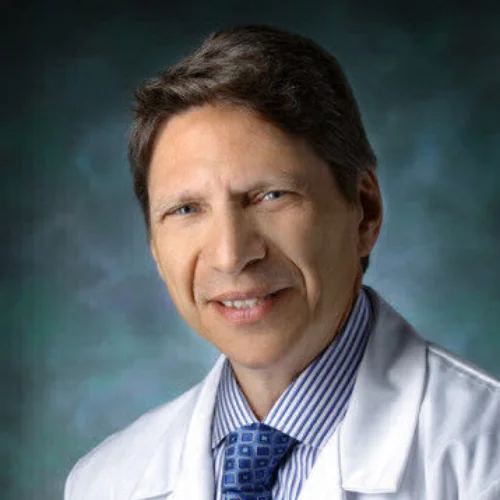
Background
Dr. Pardoll is the Abeloff Professor of Oncology, Medicine, Pathology, and Molecular Biology and Genetics at Johns Hopkins University School of Medicine. He serves as Director of the Bloomberg~Kimmel Institute for Cancer Immunotherapy and Co-Director of the Cancer Immunology Program at the Sidney Kimmel Comprehensive Cancer Center.
Dr. Pardoll earned his M.D. and Ph.D. from Johns Hopkins in 1982, completed his Medical Residency and Oncology Fellowship in 1985, and worked at the NIH before joining Johns Hopkins in 1988. He has published over 300 papers and 20 book chapters on T cell immunology and cancer vaccines. He has also served on editorial boards of the Journal of the National Cancer Institute and Cancer Cell and scientific advisory boards for several prestigious institutions like the Cancer Research Institute, the University of Pennsylvania Human Gene Therapy Gene Institute, Biologic Resources Branch of the National Cancer Institute, Harvard-Dana Farber Cancer Center, Cerus Corporation, Global Medical Products Corporation, etc.
Dr. Pardoll has made significant contributions to Cellular Immunology, including discovering gamma-delta T cells, NKT cells, and interferon-producing killer dendritic cells. His research over the past two decades has focused on dendritic cell biology, immune regulation, and cancer immune evasion. He is an inventor of immunotherapies like GVAX and Listeria monocytogenes-based cancer vaccines. He also identified a PD-1 inhibitory receptor ligand and led the development of PD-1 pathway-targeted antibodies, proving their efficacy in multiple cancers.
His extensive publications cover cancer vaccines, gene therapies, cancer prevention technologies, and recombinant immune modulatory agents for specific immune pathways.
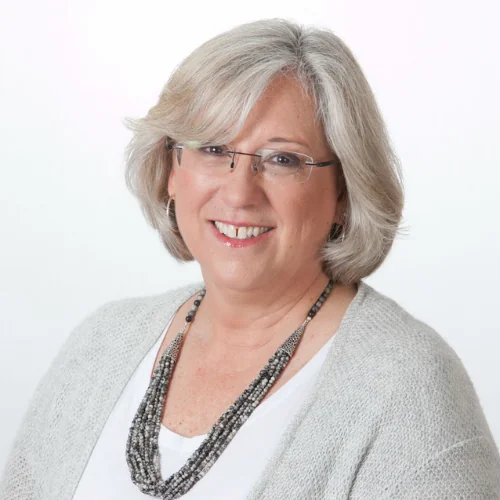
Dr. Coussens is Chairwoman of the Department of Cell, Developmental and Cancer Biology and Associate Director for Basic Research in the Knight Cancer Institute at Oregon Health & Science University, where she holds the Hildegard Lamfrom Endowed Chair in Basic Science.
Dr. Coussens’ research focuses on dissecting the roles of normal immune cells in regulating various facets of solid tumor development, identifying leukocyte activities that are co-opted by early tumors to support ongoing cancer development and in understanding the role leukocytes play in regulating responses to cytotoxic, targeted and immune-based therapies. Utilizing mouse models of mesothelioma, cutaneous, head and neck, pancreas and mammary carcinoma, her research identified critical immune-regulated pathways for therapeutic targeting that are being clinically translated in combination with chemotherapy in women with metastatic triple-negative breast cancer, pancreas cancer and head/neck squamous cancer.
In recognition of her contributions for revealing underlying mechanisms of cancer development, Dr. Coussens has been acknowledged with multiple awards, including the American Association for Cancer Research (AACR) Gertrude B. Elion Award (2001), the AACR-Women in Cancer Research Charlotte Friend Memorial Lectureship (2012), the 13th Rosalind E. Franklin Award from the National Cancer Institute (2015), a Doctor in Medicine (honoris causa) from the University of Buenos Aires in Argentina (2018), the 12th AACR-Princess Takamatsu Memorial Lectureship (2018), a Career Award from the European Academy of Tumor Immunology (2018) and the 2018 Susan G. Komen Brinker Award for Scientific Distinction in Basic Science.
She has been elected as Fellow of the American Association for Advancement of Science (AAAS; 2018); Fellow of the AACR Academy (2019); and recently elected as President of the American Association for Cancer Research (2022-2023).
Aditya Bardia, MD, MPH, FASCO
Professor of Medicine, Geffen School of Medicine, University of California Los Angeles,
Director of Translational Research Integration, UCLA Health Jonsson Comprehensive Cancer Center
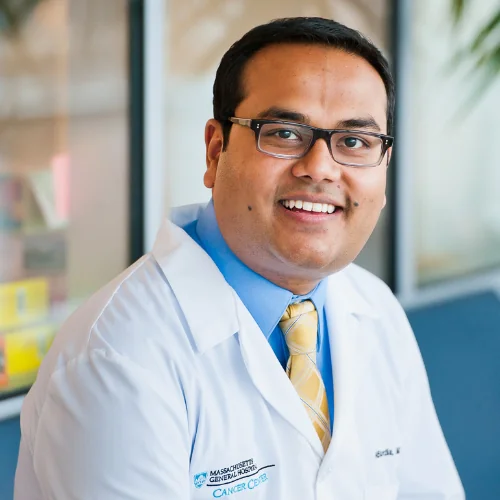
Dr. Aditya Bardia is a distinguished breast medical oncologist and physician scientist specializing in developing targeted and personalized therapies for breast cancer. He recently joined the David Geffen School of Medicine at UCLA and the UCLA Health Jonsson Comprehensive Cancer Center, where he will hold several leadership roles, including Director of the Breast Cancer Clinical and Research Programs, Assistant Chief of Translational Research, Director of Translational Research Integration, and Co-Director of the Breast Cancer Disease Site Group.
Dr. Bardia has a remarkable track record of leading clinical trials, particularly in the development of antibody-drug conjugates (ADCs) for breast cancer. He was instrumental in the development of sacituzumab govitecan, the first ADC approved for metastatic triple-negative breast cancer, as well as other therapies like trastuzumab deruxtecan, datopotamab deruxtecan, and elacestrant, the first oral SERD for metastatic hormone receptor-positive breast cancer. His research team has made significant contributions to understanding resistance mechanisms in breast cancer, including the roles of ESR1, RB1, and TOP1 mutations.
Before joining UCLA, Dr. Bardia was an attending physician and Director of Breast Cancer Research at Massachusetts General Hospital and an Associate Professor at Harvard Medical School. His accolades include the Young Investigator Award from ASCO, the Distinguished Researcher Award from the Massachusetts Society of Clinical Oncologists, and recognition as a Highly Cited Researcher in 2022 and 2023.

Chernoff, a molecular oncologist and board-certified medical oncologist, has been with Fox Chase since 1991, where he has significantly influenced the institution’s research strategy. He has focused on translational research, precision medicine, epigenetics, signaling reprogramming, immunotherapy, hematologic malignancies, and cancer disparities. His laboratory has made fundamental contributions to understanding factors that control cell growth and movement, including oncogenes and tumor-suppressor genes. Chernoff holds the Stanley P. Reimann Chair in Oncology Research.
He has trained numerous postdoctoral and graduate students at Fox Chase and serves as an adjunct professor at Drexel University School of Medicine and the University of Pennsylvania. He is also a member of the Cancer Signaling and Epigenetics research program at Fox Chase.
Chernoff has served on several external advisory boards, including those for Nexgenix Pharmaceuticals, Genentech, Novartis Pharmaceuticals, and the New York University (Perlmutter) Cancer Center. Within Fox Chase, he has taken on various roles in multiple committees and programs.
Chernoff earned his bachelor’s degree in molecular biophysics and biochemistry from Yale College and his M.D. and Ph.D. from Mount Sinai School of Medicine in New York. He completed his residency in internal medicine at the University Health Center of Pittsburgh and a clinical fellowship in medical oncology at Johns Hopkins Oncology Center. He then held a postdoctoral fellowship in cellular and developmental biology at Harvard University before joining Fox Chase.
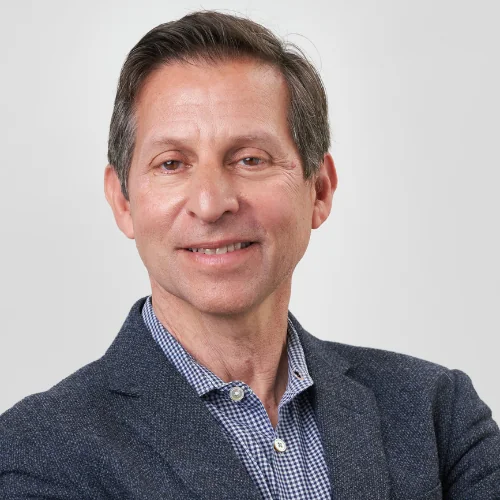
Paul Mischel, M.D., is a physician scientist trained in pathology and cancer biology. He is Professor and Vice Chair for Research, for the Department of Pathology, Stanford Medicine, and an Institute Scholar in Sarfan ChEM-H, Stanford University. His laboratory has made a series of seminal discoveries published in Nature, Science, and Nature Genetics, that have identified a central role for ecDNA (extrachromosomal DNA) in cancer development, progression, accelerated tumor evolution and drug resistance. These findings have provided a new understanding of the fundamental mechanisms of oncogene amplification and the spatial organization of altered tumor genomes, launching a new area of cancer research that links circular architecture with tumor pathogenesis.
Paul leads Team eDyNAmiC, which was awarded one of the $25M Cancer Grand Challenges Awards from CRUK and the National Cancer Institute, to tackle the extrachromosomal DNA grand challenge. Paul’s lab has also uncovered actionable metabolic co-dependencies that are downstream consequences of oncogene amplification, including in the highly lethal brain cancer glioblastoma, that are poised for therapeutic exploitation. Paul is a member of the National Academy of Medicine. He is also an elected Fellow and Past-President of the American Society for Clinical Investigation. Fellow of the American Association of Physicians, and a Fellow of the American Association for the Advancement of Science. Mischel is also a founder of Boundless Bio., Inc.
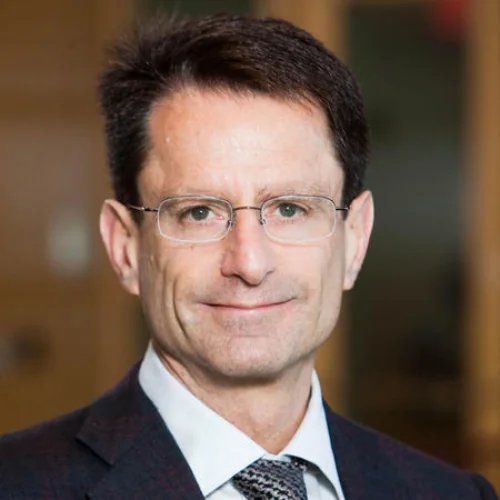
Scott M. Lippman, MD, is Associate Vice Chancellor for Cancer Research and Care, Professor of Medicine at UC San Diego School of Medicine, and holds the Chugai Pharmaceutical Chair in Cancer. He is also an adjunct professor at the Salk Institute, Sanford-Burnham Medical Research Institute, and MD Anderson Cancer Center.
Dr. Lippman has been featured in every major “Top Doctor” listing, including U.S. News & World Report, and has received numerous awards such as the ASCO Award, AACR Award, and ASCO Statesman Award. With over 25 years of experience as a principal investigator in translational research, he has led clinical trials and played a significant role in national clinical/translational research planning within the NCI Cooperative Group. He currently serves on the NCI’s Clinical Trials and Translational Research Advisory Committee and is a Board member of AACR, the Association of American Cancer Institutes, and the National Comprehensive Cancer Network. He has also served on the FDA Oncologic Drugs Advisory Committee.
Dr. Lippman is an elected member of the Association of American Physicians and has authored over 300 publications in high-impact journals like The New England Journal of Medicine, the Journal of the American Medical Association, the Proceedings of the National Academy of Sciences, and The Lancet, as well as chapters in major medical textbooks.
Before UC San Diego Health, he was Chair of the Department of Thoracic/Head and Neck Medical Oncology at MD Anderson Cancer Center. He completed fellowships in hematology and medical oncology at Stanford and the University of Arizona and received his medical degree from Johns Hopkins University School of Medicine. He is board-certified in internal medicine, hematology, and medical oncology.
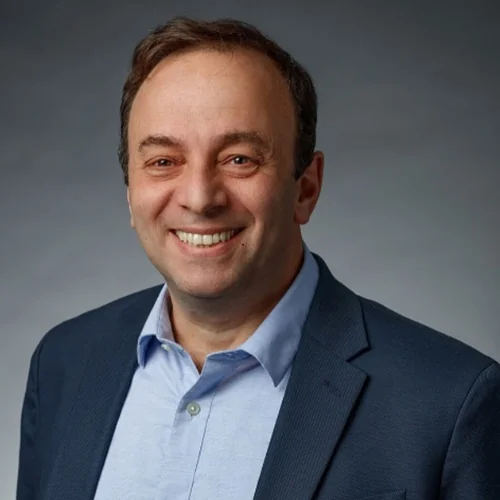
Carlos Doti, Vice President and Head of Medical Affairs for the US Oncology Business Unit at AstraZeneca, develops the medical strategy for the haematology franchise, supporting the global launch of Calquence (acalabrutinib) and building capabilities in acute myeloid leukaemia, myelodysplastic syndromes, and aggressive non-Hodgkin lymphomas. As a haematologist with extensive expertise in cancer and haematologic malignancies, Carlos is dedicated to delivering treatments that significantly impact patients’ lives.
Since joining AstraZeneca in 2016 as a Medical Director, Carlos advanced to Oncology Business Unit Director for Argentina and Uruguay, managing strategic initiatives and overseeing operations. Later, he led the haematology commercial team, supervising a cross-functional team supporting acalabrutinib across Latin America, the Middle East, and Asia-Pacific.
With over a decade of pharmaceutical industry experience, Carlos previously held medical affairs roles at Novo Nordisk A/S and Pfizer, where he developed portfolio strategies, managed product launches, and handled pricing and market access in emerging markets. This experience has provided him with a deep understanding of the complexities involved in bringing innovative therapies to diverse populations.
Carlos’s work is supported by more than 70 congress presentations and several peer-reviewed publications. He has also served as an investigator in over 25 clinical trials focusing on haemostasis, onco-haematology, and infectious diseases, contributing to advances in these fields. Before joining the private sector, Carlos trained in haematology at Mount Sinai Medical Center in New York and the British Hospital in Buenos Aires, where he served as an attending physician. His extensive training and clinical experience drive his commitment to advancing haematologic cancer treatments at AstraZeneca.
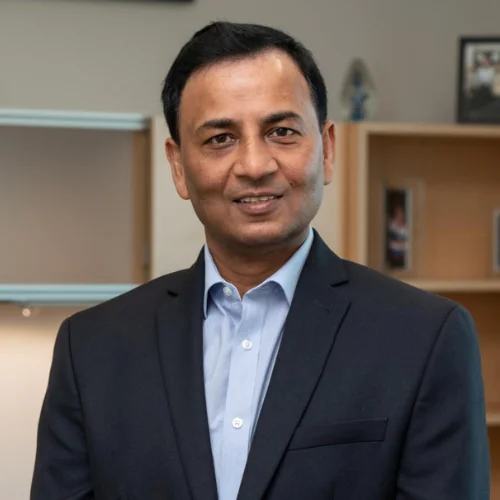
Ajay Goel, Ph.D., AGAF, is a leading innovator in cancer care with a strong record of patented advancements in early detection and precision treatment. In June 2019, he joined City of Hope as the founding chair of the Department of Molecular Diagnostics and Experimental Therapeutics and the founding director of Biotech Innovations at Beckman Research Institute. He also serves as the associate director of basic science for the comprehensive cancer center and is a fellow of the American Gastroenterology Association.
Dr. Goel is a recognized expert in gastrointestinal and other cancers, currently developing early-detection blood tests for colon, pancreatic, and ovarian cancers. Notably, he has created a test for pancreatic cancer capable of detecting the disease up to seven years earlier than current methods. These tests are poised to become a routine part of annual health screenings within the next few years, similar to tests for diabetes or cholesterol.
In addition to his work in diagnostics, Dr. Goel is pioneering genomic-based precision oncology, exploring why therapies are effective for some patients but not others. His contributions to the field include more than 300 peer-reviewed articles and over 30 international patents in genomics and transcriptomics.
Born in India, Dr. Goel earned his Ph.D. in biophysics from Punjab University and completed postgraduate work at the University of California San Diego. He spent 16 years at Baylor Scott & White Research Institute before joining City of Hope. Beyond his scientific achievements, Dr. Goel integrates the ancient Indian medical system Ayurveda into his philosophy, emphasizing the importance of prevention as the best medicine.
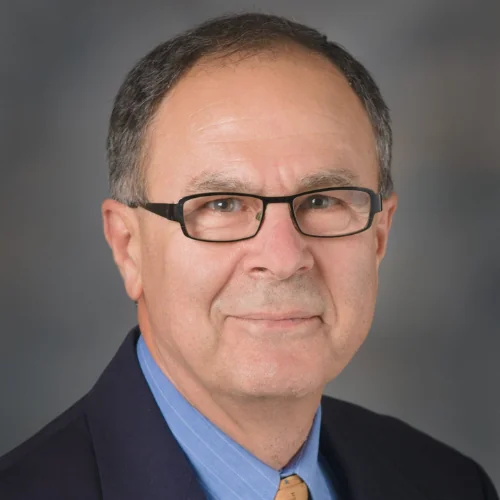
Dr. Samir M. Hanash is a leading figure in cancer research, holding several prestigious positions at The University of Texas MD Anderson Cancer Center. He serves as the Director of the Department of Red and Charline McCombs Institute for the Early Detection and Treatment of Cancer, Co-Director of the Center for Global Cancer Early Detection, and the Distinguished Chair for Cancer Prevention in the Evelyn & Sol Rubenstein Distinguished Chair. Additionally, he is a Professor in the Department of Clinical Cancer Prevention and holds a dual appointment as a Professor in the Department of Molecular Pathology.
Dr. Hanash’s work is integral to the Proteomics platform within MD Anderson’s Moon Shots Program. This platform uses advanced technologies to analyze vast amounts of data from blood, tumor, and tissue samples, identifying cancer-specific proteins that can be used in diagnostic tests and targeted therapies. His expertise also extends to developing early detection tests for various cancers, including lung and pancreatic cancers, potentially detecting diseases years earlier than current methods allow.
With a career dedicated to cancer research, Dr. Hanash has significantly contributed to the field by bridging the gap between basic science and clinical applications. His work has not only enhanced our understanding of cancer biology but also opened new avenues for early diagnosis and treatment, making him a key figure in the fight against cancer.
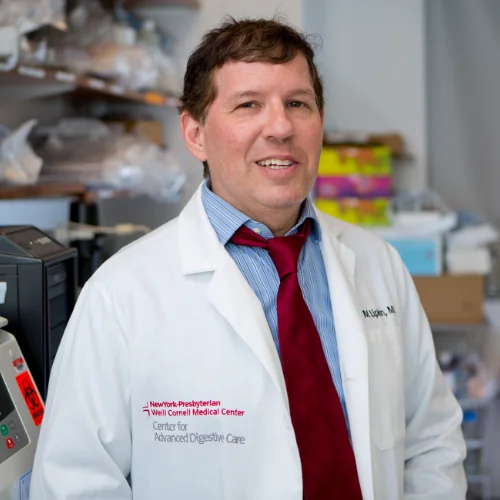
Dr. Lipkin is a distinguished physician-scientist and Vice Chair for Research at the Weill-Cornell Department of Medicine. He directs the Adult and Cancer Genetics Clinic and the Program in Mendelian Genetics, focusing on hereditary cancer syndromes. Dr. Lipkin has published extensively in leading journals such as Cell, Nature Genetics, and Science. As a member of the FDA Molecular and Clinical Genetics Panel, he contributes to the approval of new genetic tests in the U.S.
Dr. Lipkin’s research laboratory utilizes advanced techniques like massively parallel sequencing and genomics to explore the genetic mechanisms of cancer. He discovered and characterized MLH3, a gene linked to colorectal cancer, and identified several B cell malignancy predisposition genes. His lab pioneered modeling human cancer cells in immune-competent mice and made significant advances in understanding cancer-initiating cells.
Currently, Dr. Lipkin leads an NCI multi-institutional Center for Cancer Immunoprevention, focusing on precision prevention and therapies for DNA repair-deficient cancers. A board-certified Medical Geneticist, he specializes in genetic testing for hereditary gastrointestinal cancer syndromes, including Lynch Syndrome and Familial Adenomatous Polyposis. He is also the creator of MAPP-MMR, a bioinformatics tool for interpreting Lynch syndrome variants.
Dr. Lipkin practices at Weill Cornell Medical College and New York-Presbyterian Hospital. He completed his Internal Medicine training at Duke University and specialized in Medical Genetics at the National Human Genome Research Institute.

Dr. Sapna Syngal, M.D., MPH, is the Director of Research in the Division of Cancer Genetics and Prevention at Dana-Farber Cancer Institute (DFCI). A leader in the field of cancer genetics, Dr. Syngal has dedicated her career to advancing the understanding and prevention of hereditary cancers. She earned her MD from McGill University in 1990 and completed her clinical training in Internal Medicine and Gastroenterology at Brigham and Women’s Hospital. In addition, she obtained her MPH from Harvard School of Public Health and pursued a research fellowship at the Harvard Education Program in Cancer Prevention, joining DFCI in 1995.
Dr. Syngal’s research primarily focuses on the early detection of cancer in individuals with genetic predispositions. As a Zhu Family Center Senior Fellow and recipient of the DF/HCC Incubator Award, she leads a team dedicated to assessing novel technologies for early cancer detection in hereditary cancer cohorts. The goal of this research is to generate pilot data that can serve as a foundation for large-scale, multi-PI grant applications, ultimately translating these technologies into clinical use for both high-risk individuals and the general population.
In addition to her research, Dr. Syngal has authored numerous publications in leading medical journals and is recognized for her contributions to the field of cancer prevention. Her work has significantly impacted the development of screening guidelines and preventive strategies for hereditary cancer syndromes, helping to improve outcomes for patients at risk.
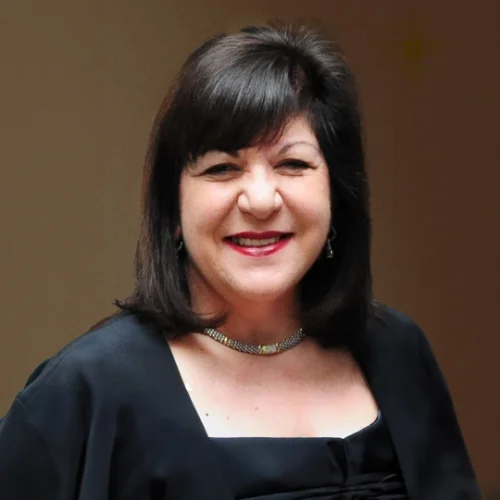
Margaret Foti, PhD, MD (hc), is the Chief Executive Officer of the American Association for Cancer Research (AACR), the largest cancer research organization globally. Under her leadership, AACR’s membership has grown from around 3,000 to over 58,000 members across 142 countries. She has also expanded the AACR’s portfolio of peer-reviewed scientific journals from one to ten, establishing a critical platform for cancer research dissemination.
Foti began her AACR career in an editorial role with the journal Cancer Research and advanced through key positions to become CEO. She played a pivotal role in launching major journals such as Cancer Discovery, Clinical Cancer Research, and Cancer Immunology Research, and initiated Cancer Today, a magazine for patients and survivors. A Temple University alumna, Foti is a significant force in advancing cancer research and has served as president of three professional societies while holding numerous leadership roles in nonprofit organizations.
Under her guidance, AACR has become the Scientific Partner of Stand Up To Cancer (SU2C), contributing to scientific peer review, project management, and science policy efforts. She was instrumental in producing the AACR Cancer Progress Report and the AACR Cancer Disparities Progress Report, which address cancer health disparities.
Foti’s contributions have been recognized with numerous prestigious awards, including the 2024 Beacon Award for Women Leaders in Oncology and being named a Philadelphia Business Journal Women of Influence honoree. She has also received honorary degrees from the University of Rome La Sapienza and the University of Catania in Sicily. In 2007, the AACR established the Margaret Foti Award for Leadership and Extraordinary Achievements in Cancer Research in her honor.

Dr. Nabanita Nawar, Ph.D., is the CEO and Co-Founder of HDAX Therapeutics, where she leads the company with her expertise in drug discovery, leadership, governance, and science policy. She earned her PhD in Medicinal Chemistry from the University of Toronto, and her forward-thinking vision has been instrumental in driving HDAX’s growth.
Dr. Nawar’s achievements have been widely recognized in the scientific community. In 2023, she was honored as a Forbes 30 Under 30 honoree for Toronto, and in 2022, she was named the Rising Star by the Ontario Institute for Cancer Research for her exceptional leadership and innovation. Her impressive portfolio includes 10 high-impact publications and 2 patent applications, reflecting her significant contributions to the field of medicinal chemistry.
Throughout her career, Dr. Nawar has garnered over 20 awards and recognitions, including the Canadian Silver Medal from the Chemical Institute of Canada, The Society of Chemical Industry Merit Award, and the Top Scholar distinction at the University of Toronto. These accolades highlight her dedication to advancing scientific research and her role as a leader in the field.
As CEO of HDAX Therapeutics, Dr. Nawar continues to drive the company’s mission to develop innovative therapies, combining her scientific acumen with a commitment to improving patient outcomes.

Paraskevi Giannakakou, Ph.D., CSO, ARMA Bio
Dr. Paraskevi Giannakakou, Ph.D., is the Chief Scientific Officer (CSO) and Co-Founder of ARMA Bio. She has over 20 years of experience in cancer biology and molecular oncology. Dr. Giannakakou is also the Director of Oncology/Hematology Research at Weill Cornell Medicine and the Associate Director of Cancer Research Training and Education at the Meyer Cancer Center. Her research focuses on understanding the molecular mechanisms of drug resistance in cancer and developing novel therapeutic strategies.
Her lab has identified critical microtubule-dependent pathways involved in cancer progression and resistance, including the role of AR-V7 in prostate cancer. To bring her research into clinical practice, Dr. Giannakakou developed a liquid biopsy program that isolates and characterizes circulating tumor cells (CTCs) from cancer patients.
Dr. Giannakakou is also dedicated to mentoring, having guided over 50 predoctoral and postdoctoral fellows, as well as junior faculty, through the NCI-funded T32 postdoctoral training grant in Molecular and Translational Oncology Research (MTOR). She founded the FARM (Faculty Advancement and Research Mentorship) program, which boasts a high success rate in securing NIH funding for junior investigators.
Her work has been recognized with several honors, including the Young Investigator Awards from the American Association for Cancer Research (AACR) and the Distinguished Female Scientist Award from the Hellenic Medical Society of New York. Dr. Giannakakou continues to lead groundbreaking research projects, including developing novel therapies for prostate cancer and advancing our understanding of cancer biology.
Matt Tremblay, Ph.D.
Board Chair of AIM-HI Accelerator Fund, CEO of Blackbird Laboratories and Managing Director of Blackbird BioVentures
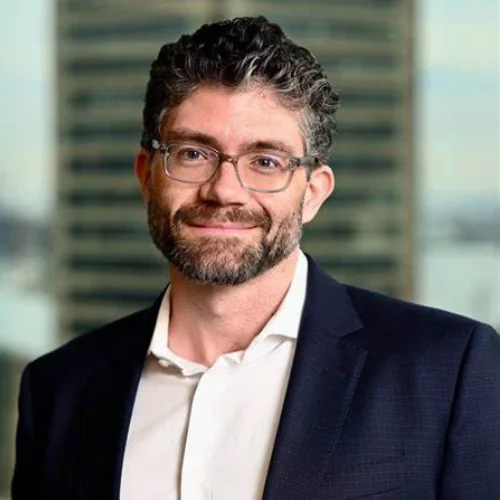
Dr. Matt Tremblay is the Chief Executive Officer of Blackbird Laboratories, a nonprofit technology development platform, and the Managing Director of Wolf Point, an early-stage biotech investment fund. Both Blackbird and Wolf Point focus on catalyzing the creation of new medicines and enabling technologies in Baltimore.
Before joining Blackbird, Dr. Tremblay served as the Chief Operating Officer of Scripps Research and its drug discovery division, Calibr. During his tenure, he played a pivotal role in advancing innovative drug discovery projects. Dr. Tremblay earned his PhD in Chemistry from Columbia University and completed postdoctoral work under the mentorship of Dr. Peter Schultz at Scripps Research. Following his postdoctoral training, he led a research group at the Genomics Institute of the Novartis Research Foundation, where he focused on cutting-edge genomics and biotechnology projects.
Dr. Tremblay’s extensive experience in both research and leadership has positioned him at the forefront of biotech innovation, particularly in fostering the development of transformative medical technologies.
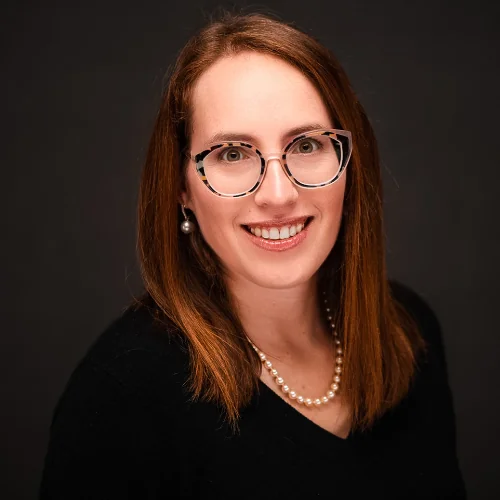
Jenny Lesser Herbach, MBA, is the Chief Executive Officer of Adventris Pharmaceuticals. With over a decade of experience in the biotech industry, Herbach has been instrumental in bringing innovative oncology drugs to market. Her career includes key roles at leading companies such as Onyx/Amgen, InterMune/Genentech, Exelixis, and Amunix, where she contributed to the development and commercialization of groundbreaking therapies.
Herbach holds an MBA from Harvard Business School and a Master’s degree from the University of Cambridge, credentials that underpin her expertise in both business strategy and scientific innovation. Under her leadership, Adventris Pharmaceuticals continues to push the boundaries of cancer treatment, with a strong focus on delivering novel therapies to market.
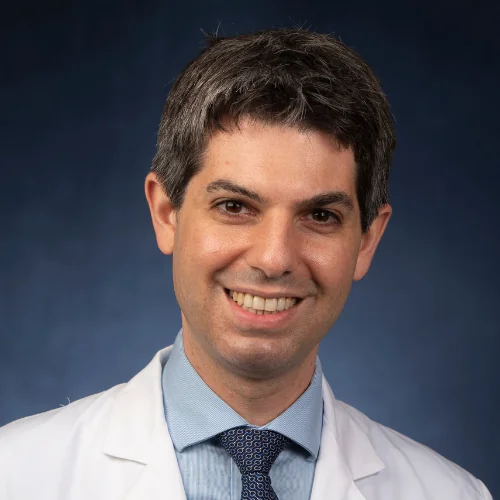
Mark Yarchoan, M.D., is an Associate Professor of Medical Oncology at the Sidney Kimmel Comprehensive Cancer Center at Johns Hopkins in Baltimore, Maryland. His clinical expertise is in the treatment of hepatobiliary cancers, and he leads an NCI-funded laboratory focused on developing innovative immunotherapies, particularly neoantigen-targeted vaccines. Dr. Yarchoan has been at the forefront of advancing therapeutic cancer vaccines for hepatobiliary cancers and has served as Principal Investigator (PI) on several notable clinical trials, including the first clinical trials of a personalized neoantigen vaccine for hepatocellular carcinoma (HCC), neoadjuvant anti-PD1 immunotherapy in HCC, and a neoantigen-specific T-cell vaccine for fibrolamellar hepatocellular carcinoma (FLC). He is also a scientific co-founder of Adventris Therapeutics.
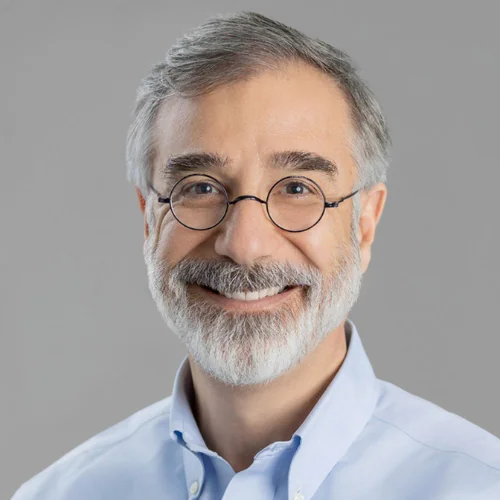
Dr. Samir N. Khleif is a renowned pioneer in the field of immunotherapy, with a distinguished career as a medical oncologist, immunologist, and transformational leader in healthcare and biomedical research. He is the CEO of Georgiamune, where he continues to advance innovative cancer treatments. Prior to this role, Dr. Khleif held several prominent academic and leadership positions, including serving as a scientist and Chief of the Cancer Vaccine Section at the National Cancer Institute (NCI), where he spearheaded the development of groundbreaking immune-oncology therapies and cancer vaccines.
Dr. Khleif also played a crucial role in international healthcare as the founding director and CEO of the King Hussein Cancer Center in Amman, Jordan, which he developed into the largest cancer center in the MENA region. He further served as the director of the Georgia Cancer Center at Augusta University. In addition to his leadership roles, Dr. Khleif is a biomedical scholar and professor at Georgetown University Medical School.
His influence extends to regulatory affairs, having served as a Special Assistant to the Commissioner of the FDA, where he led the Critical Path Initiative for Oncology. Dr. Khleif is a member of the board of directors for Ayala Pharmaceuticals and Emerald Biopharmaceutics and has advised over 20 biotech and pharmaceutical companies. A key opinion leader in immunology, he has contributed extensively to national committees, including the Biden Cancer Initiative and the Parker Institute for Cancer Immunotherapy.
Dr. Khleif is also an accomplished author and inventor, with over 150 patents and hundreds of peer-reviewed publications, making significant contributions to the field of immunology and immunotherapy.
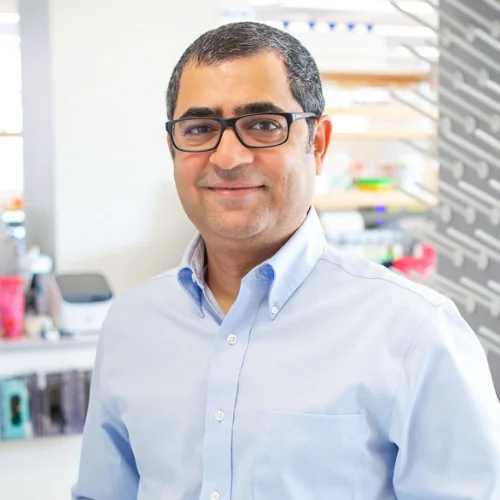
Vipin joined Clasp Therapeutics in April 2024, bringing over two decades of experience in the biotech and pharmaceutical industry, with a focus on developing cell therapies for cancer. Before joining Clasp, Vipin served as the Chief Scientific Officer at Catamaran, where he played a pivotal role in advancing their therapeutic pipeline. Prior to that, he co-founded and led Discovery Research at Obsidian Therapeutics, where his work led to the development of the cytoDRive platform, significantly expanding the therapeutic potential of cell and gene therapies.
Vipin was also a founding team member and Head of Biology at Serien Therapeutics (formerly Raze Therapeutics), where his research focused on discovering novel anticancer agents by exploiting unique vulnerabilities in rapidly growing tumors. Additionally, he served as an Entrepreneur in Residence at Atlas Venture, contributing his expertise to emerging biotech ventures.
Earlier in his career, Vipin spent over a decade in the pharmaceutical industry, working at GSK, Pfizer, and Wyeth. His research during this time spanned the development of novel small molecules, peptides, nucleic acids, and protein therapeutics across a variety of therapeutic areas.
Vipin holds a PhD in biochemistry from Brandeis University and an MBA from the Yale School of Management. His extensive experience and deep expertise in the field make him a key leader in advancing innovative cancer therapies at Clasp Therapeutics.
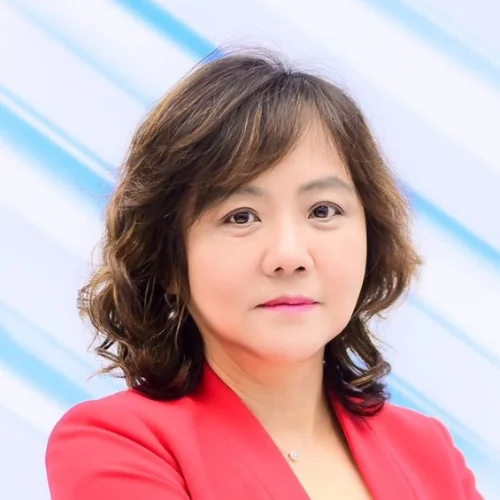
Lily Zou, PhD, MBA, is the Co-founder and CEO of Degron Therapeutics. She is a seasoned executive with scientific knowledge in drug discovery and development, and extensive business and commercial expertise. Dr. Zou led Degron in successful capital raise, expanding its platform, and advancing its pipeline programs.
Before joining Degron, Dr. Zou served as CEO of Fosun Pharma USA, Vice President of Fosun Pharma Group, Healthcare Partner of Fosun Pharma, and Chairman of the Board or Board member of four Fosun-invested companies. Dr. Zou built and grew Fosun Pharma’s US business and founded Fosun Pharma’s incubator, Boston-based Fusion Bioventures, which invests and incubates early-stage biotech companies. Dr. Zou also built a sales and marketing team in the USA for Fosun Pharma drugs and diagnostics, and launched Fosun Pharma’s first products in 2019.
Prior to working at Fosun, Dr. Zou worked at a top management consulting firm (Bain), in large pharma companies (Novartis/Sandoz, Wyeth, Millennium), and small biotech startups (ArQule, Coley)
Dr. Zou received a BS from Beijing University, a PhD in Microbiology and Immunology from Cornell University, and an MBA from MIT Sloan School of Management.

Ronald Herbst, Ph.D., joined Biolojic Design as Chief Scientific Officer on October 3, 2022. A 28-year industry veteran, Dr. Herbst has a proven track record of scientific leadership in both Big Pharma and small publicly traded biotechnology companies. He joined Biolojic Design as the company expanded its U.S. operations and advanced more computationally designed, smart antibodies into the clinic.
Throughout his 28-year career in the biopharmaceutical industry, Dr. Herbst has applied his expertise to various companies and development opportunities, from early-stage startups to globally established firms. As CSO at Pyxis Oncology, Dr. Herbst was instrumental in building the research team and guiding the company’s transition into a clinical-stage entity. During his tenure, Pyxis completed an initial public offering (IPO) that raised $168 million.
Previously, Dr. Herbst served as Vice President of Research and Development and Head of Oncology Research at MedImmune, the global biologics research and development arm of AstraZeneca. Under his leadership, the oncology group advanced 10 novel targets to the clinic. His earlier work at MedImmune focused on respiratory, inflammation, and autoimmunity, where he contributed to advancing four novel molecules into the clinic. Before MedImmune, Dr. Herbst was a Senior Principal Investigator in oncology at DNAX, a Schering-Plough biotechnology subsidiary.
Dr. Herbst earned his Ph.D. at Ludwig-Maximilian University of Munich and conducted postdoctoral research in the Department of Biology at Stanford University. He has (co)-authored more than 100 publications and is co-inventor on 17 pending or granted patents.
Dave Greenwald, Ph.D.
Vice President Business Development of Deerfield and CEO, Aviko Radiopharmaceuticals

David Greenwald, Ph.D., serves as Aviko’s chief executive officer and sits on the company’s board of directors. Since 2018, Dave has been vice president, business development on the therapeutics team at Deerfield Management. Before joining Deerfield, he was the director of business development at Johns Hopkins Technology Ventures. Dave was a co-founder and chief executive officer of Relay Technology Management, Inc., and a co-inventor of the Relay Innovation Engine software platform. After Relay was acquired by Decision Resources Group, he served as the director of client solutions there. Dave was a Howard Hughes Medical Institute research fellow while earning a bachelor’s degree in cellular biology and molecular genetics from the University of Maryland, College Park, and earned his doctorate in genetics from Tufts University. He currently serves on the boards of Jaguar Gene Therapy, Axovia Therapeutics Apertura Gene Therapy, Innervace and Aviko.
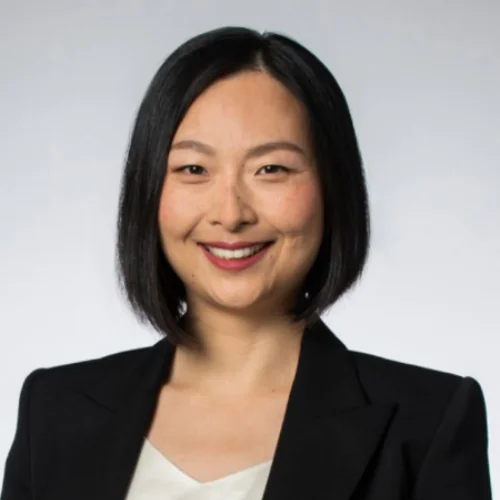
Dr. Lu is an Investor at Yosemite, an oncology-focused firm spun out of Emerson Collective Health. Dr. Lu specializes in company creation and early-stage investments of breakthrough technologies across therapeutics, diagnostics, and tools & reagents in Oncology. She brings ~20 years of life science experience across R&D, business development, corporate strategy and operations, and venture investment.
Prior to Yosemite, Dr. Lu was Strategy & Operations Director at Amgen US, responsible for driving and executing key decisions for ~50% of Amgen’s business. At Amgen, Dr. Lu led large cross-functional initiatives that transformed business performance, successfully commercialized new products, and innovated customer engagement models. Before Amgen, she spent 4 years at McKinsey & Company helping numerous pharmaceutical companies solve challenges including R&D strategy and operations, business development, and commercialization strategies.
Dr. Lu has deep scientific expertise in immuno-oncology and therapeutic protein engineering. She completed her undergraduate education in Chemical Biology at UC Berkeley with the highest honor, Ph.D. in Chemistry at California Institute of Technology, and immuno-oncology postdoctoral fellowship at Harvard University.

Marie-Claire Peakman, MRPHARMS, PHD is a Partner at Pfizer Ventures and Executive Director, Worldwide Business Development. Marie-Claire is responsible for identifying, evaluating, making and managing equity investments aligned with the future directions of Pfizer. She currently has responsibility for Pfizer’s investments in Capstan Therapeutics, Crossbow Therapeutics, DEM Biopharma, Grey Wolf Therapeutics, Mediar Therapeutics, Mozart Therapeutics and TRex Bio.
Marie-Claire brings 25 years of scientific leadership at Pfizer, delivering small molecule therapeutics to the clinic and to market across multiple therapeutic areas. Most recently she led the Primary Pharmacology Group which she founded in 2009 and which played key roles in the identification of Paxlovid™ (nirmatrelvir), Cibinqo™ (abrocitinib), Litfulo™ (ritlecitinib) and multiple other small molecules currently in the clinic. She has additional experience leading compound management, high throughput ADME, data support and management, genetically modified models, bioimaging and biobanking. Prior to Pfizer Marie-Claire gained experience at The Wellcome Foundation, at Guy’s Hospital, London, UK and held postdoctoral positions at Yale University. She is a member of the advisory board for Connecticut Bioscience Innovation Fund and has multiple roles on non-profit boards in the community.
Marie-Claire received a B.Pharm.Hons. degree in Pharmacy and a Ph.D. in Physiology & Pharmacology from the University of Nottingham U.K. She is a member of the Royal Pharmaceutical Society.
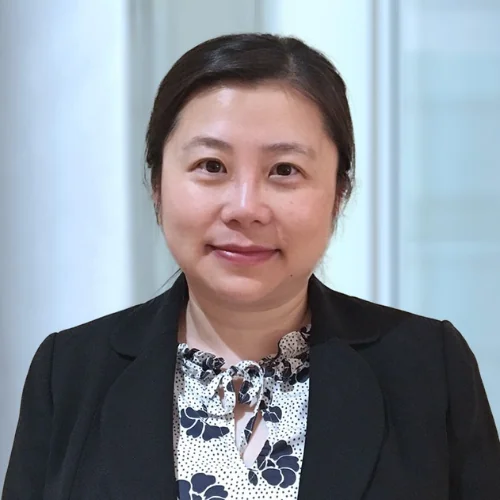
Current role
Fei is currently the Managing Director of Boehringer Ingelheim Venture Fund USA. She joined the Boehringer Ingelheim Venture Fund in 2020 and is located in Boston, MA. She served as board member of Abexxa Biologics in Arlington. Currently, she is on the Boards of ArrePath in Princeton, Libra Therapeutics in San Diego, and STRM. Bio in Cambridge.
Professional Background
Fei received her Ph.D. in Neuropharmacology from Loyola University Chicago Stritch School of Medicine and a B.Sc in Biochemistry from East China University Science & Technology. In 2007, she started her industrial career at Theravance Biopharma as an in vivo pharmacologist and led a lab in driving multiple research projects from exploratory, lead optimization to development candidate nomination, including TD-1473 in Ulcerative Colitis, Ampreloxetine in Fibromyalgia, Velusetrag in Gastroparesis, TD-8954 in Post-operative Gastrointestinal Dysfunction. In 2015, she joined Boehringer Ingelheim Pharmaceuticals Inc. Global Immunology and Respiratory Disease Research in Ridgefield where she started as a Laboratory Head and became the Head of in vivo Pharmacology group in 2016. From 2015 to 2020, before joining the BI Venture Fund, Fei led a group of ~20 in vivo pharmacologists supporting the Immunology and Respiratory Portfolio for small molecule, antisense, and antibody projects.

Kristen Berset-Harris is the host of Great Day Washington on WUSA9. Before joining the show, Kristen spent six years as WUSA9’s Sports Anchor, covering major sports events and keeping viewers informed on the latest sports news. Her deep connection to the community extends beyond the newsroom, as she shares her personal journey as a two-time breast cancer survivor.
In June 2017, Kristen was honored with the Ted Yates Award from the National Capital Chesapeake Bay Chapter of the Emmy Awards, recognizing her courage both on and off the job. After her second battle with breast cancer, Kristen returned to WUSA9 in August 2017, determined to use her platform to advocate for breast cancer awareness and the importance of early detection. Her personal experience has fueled her passion for supporting cancer research, a mission she credits with saving her life.
Kristen’s broadcasting career began in Florida as a news anchor at WJHG in Panama City and co-host of the Professional Tarpon Tournament Series. Her journey later took her to Baltimore, where she became the Weekend Sports Anchor for WBFF and hosted the Emmy-winning Ravens Report.
A graduate of the University of Florida with a degree in Telecommunications, Kristen is a proud Gators fan. She was crowned Miss Florida USA in 2004 and was a semi-finalist in the Miss USA finals. Today, Kristen continues to use her platform to inspire others, sharing her story of survival and the critical role of advancements in cancer research.
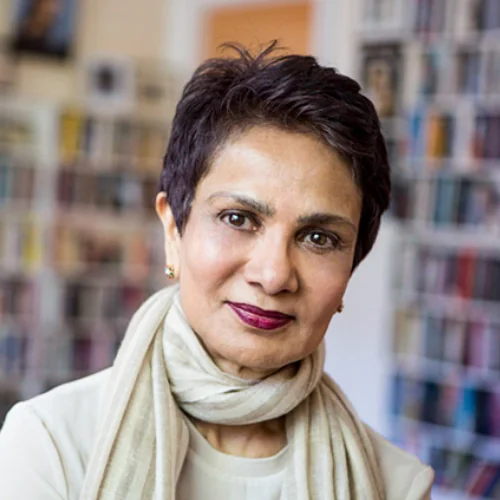
Dr. Azra Raza is the Chan Soon-Shiong Professor of Medicine, Clinical Director of the Evans Foundation MDS Center, and Executive Director of The First Cell Coalition for Cancer Survivors at Columbia University. She completed her medical education in Pakistan, followed by training in Internal Medicine at the University of Maryland, Franklin Square Hospital, and Georgetown/VA Medical Center. She completed her fellowship in Medical Oncology at Roswell Park Cancer Institute. Dr. Raza began her research in Myelodysplastic Syndromes (MDS) in 1984 and later became the Charles Arthur Weaver Professor in Oncology at Rush University, Chicago. In 2010, she relocated her MDS program and a vast Tissue Repository to Columbia University.
Dr. Raza has published extensively in top journals, including The New England Journal of Medicine, Nature, and Blood. She has mentored hundreds of students and fellows and serves on numerous national and international panels. Dr. Raza collaborates with major pharmaceutical companies like Celgene and Novartis and serves on the Board of GRAIL Inc.
She has received several awards, including the First Lifetime Achievement Award from APPNA and the Hope Award in Cancer Research, shared with Nobel Laureate Dr. Elizabeth Blackburn. Dr. Raza was named one of the 100 Women Who Matter by Newsweek Pakistan and participated in the Cancer Moonshot initiative with Vice President Joe Biden.
She is also the co-author of GHALIB: Epistemologies of Elegance, a book on the famous Urdu poet. Dr. Raza was married to the late Harvey D. Preisler, Director of the Rush University Cancer Center, and has a daughter, Sheherzad Raza Preisler.
Siddhartha Mukherjee, M.D.
2011 Pulitzer Prize Winner, Associate Professor of Medicine, Columbia University Irving Medical Center, Columbia University
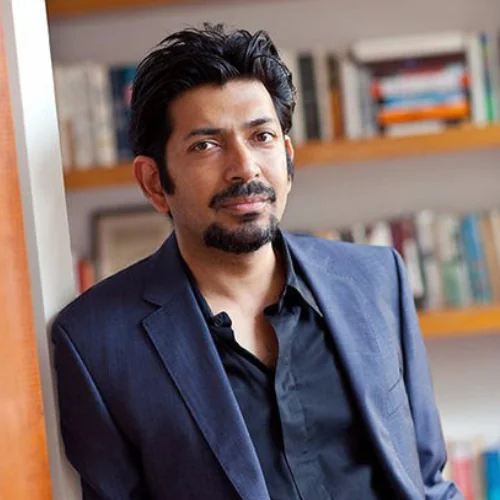
Dr. Siddhartha Mukherjee, M.D., is a 2011 Pulitzer Prize winner and Associate Professor of Medicine at Columbia University Irving Medical Center, Columbia University. Born in New Delhi, India, Dr. Mukherjee has built an illustrious career as a hematologist, oncologist, and author. He holds a BS in biology from Stanford University and earned a DPhil in immunology from Oxford University as a Rhodes Scholar. He later obtained his MD from Harvard Medical School and completed his residency in internal medicine and an oncology fellowship at Massachusetts General Hospital. At Columbia University, Dr. Mukherjee specializes in treating lymphoma and myelodysplastic syndrome.
Dr. Mukherjee gained international recognition with his Pulitzer Prize-winning book, The Emperor of All Maladies: A Biography of Cancer. The book traces the history of cancer from its ancient origins to the modern era of research and treatment, making the complex history of the disease accessible to a wide audience. The book was adapted into a three-part documentary series, directed by Barak Goodman and executive produced by Ken Burns, which aired on PBS in 2015.
In addition to The Emperor of All Maladies, Dr. Mukherjee authored The Gene: An Intimate History, exploring the history and science of genetics, and The Song of the Cell: An Exploration of Medicine and the New Human. Both books have been celebrated for their ability to present complex scientific concepts in an engaging and relatable manner.
Dr. Mukherjee’s contributions extend beyond his clinical work and writing. He is a prominent voice in the field of oncology, frequently speaking on the future of cancer research and treatment. His work has earned him numerous awards and honors, further establishing his influence in both the medical community and the public sphere.
Isaac Witz, Ph.D.
Professor Emeritus at Tel Aviv University, Co-Chair of 2024 Szent-Györgyi Prize Selection Committee and 2023 Szent-Györgyi Prize Winner
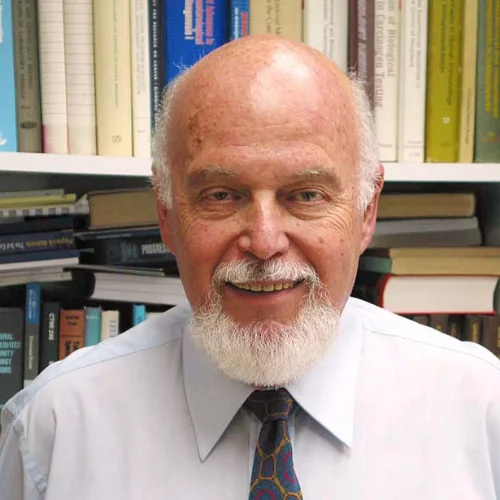
Isaac P. Witz, Ph.D., is Professor Emeritus at Tel Aviv University and Head of the Laboratory of Tumor Microenvironment & Metastasis Research at The Shmunis School of Biomedicine and Cancer Research, The George S. Wise Faculty of Life Sciences. His illustrious career spans over fifty years of breakthrough observations, discoveries, publications, and collaborations on the critical importance of the tumor microenvironment (TME) on the biology of cancer cells, their growth, and advancement to metastasis.
The experimental demonstration that constituents of the immune system find their way to the TME and affect tumor behavior was first pioneered by Prof. Witz in the 1960s, during the beginning of his scientific career. He demonstrated that humoral immune components in the TME impact tumor functions, such as growth, and are essential for efficient cellular anti-tumor immune responses. These achievements laid the foundation for aspects of contemporary immunotherapy, benefiting cancer patients and advancing steps toward finding cures for cancer.
Prof. Witz’s most significant scientific accomplishments occurred from the 1970s through the 1990s, when cancer research was dominated by a cancer cell-centric view. Against this prevailing dogma, his seminal work demonstrated that microenvironment factors, in addition to cancer’s intrinsic properties, are key collaborators in conferring aggressive malignant behavior.
In the face of skepticism, Prof. Witz shifted cancer research from a reductionist approach to a more holistic one. His work and numerous explorations of the crosstalk between the tumor and TME triggered a shift in thinking, placing focus on the TME and tumor-host interactions as determinants of tumor biology.
Dennis J. Slamon, M.D., Ph.D.
Professor of Medicine, Director of Clinical and Translational Research, Jonsson Comprehensive Cancer Center, David Geffen School of Medicine at UCLA
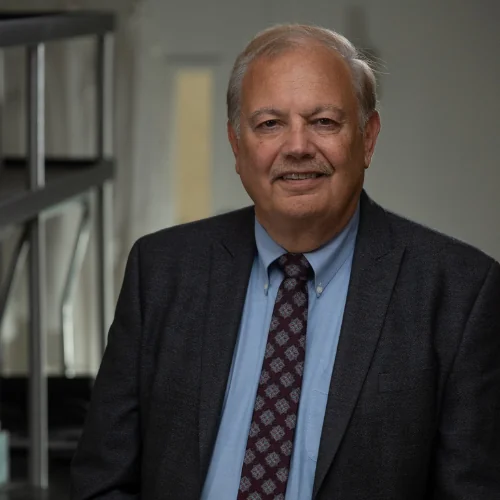
Dennis J. Slamon, MD, PhD serves as director of Clinical/Translational Research, and as director of the Revlon/UCLA Women’s Cancer Research Program at JCCC. He is a professor of medicine, chief of the Division of Hematology/Oncology and executive vice chair for research for UCLA’s Department of Medicine. Slamon also serves as director of the medical advisory board for the National Colorectal Cancer Research Alliance, a fund-raising organization that promotes advances in colorectal cancer.
For 12 years, Dr. Slamon and his colleagues conducted the laboratory and clinical research that led to the development of the new breast cancer drug Herceptin, which targets a specific genetic alteration found in about 25 percent of breast cancer patients. To acknowledge Slamon’s accomplishments, President Clinton appointed Slamon to the three-member President’s Cancer Panel in June 2000.
A 1975 honors graduate of the University of Chicago’s Pritzker School of Medicine, Slamon earned his PhD in cell biology that same year. He completed his internship and residency at the University of Chicago Hospitals and Clinics, becoming chief resident in 1978. One year later, he became a fellow in the Division of Hematology/Oncology at UCLA.
Funmi Olopade, MD, FACP
Walter L. Palmer Distinguished Service Professor of Medicine, University of Chicago and Director, Center for Clinical Cancer Genetics
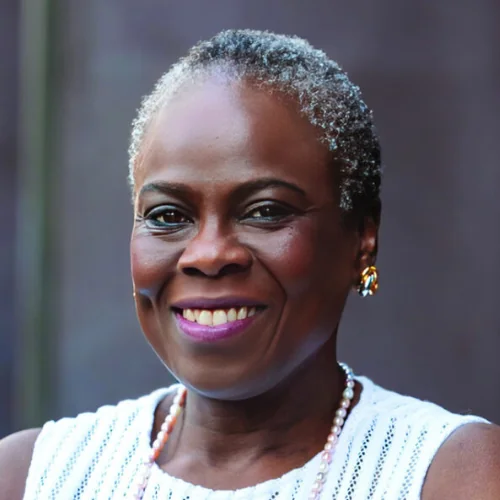
Olufunmilayo I. Olopade, MD, FACP, is an expert in cancer risk assessment and individualized treatment for the most aggressive forms of breast cancer, having developed novel management strategies based on an understanding of the altered genes in individual patients. She stresses comprehensive risk reducing strategies and prevention in high-risk populations, as well as earlier detection through advanced imaging technologies.
Dr. Olopade is internationally renowned for her expertise in breast cancer, and her research has advanced early detection, treatment and prevention of breast cancer in women at high risk for the disease. A distinguished scholar and mentor, Olopade has received numerous honors and awards including honorary degrees from six universities and a 2005 MacArthur Fellowship (“Genius grant”) for “translating findings on the molecular genetics of breast cancer in African and African-American women into innovative clinical practices in the United States and abroad.”
Dr. Olopade has received numerous honors and awards, including honorary degrees from North Central, Dominican, Bowdoin and Princeton universities. She is also a recipient of the Doris Duke Distinguished Clinical Scientist and Exceptional Mentor Award, an American Cancer Society Clinical Research Professorship, a MacArthur Foundation “Genius” Fellowship and Officer of the Order of the Niger Award. Dr. Olopade is an elected member of the American Academy of Arts and Sciences, the American Philosophical Society and the National Academy of Sciences. She currently serves on the board of directors for the American Board of Internal Medicine, the National Cancer Advisory Board, Susan G. Komen for the Cure, Cancer IQ and the Lyric Opera.
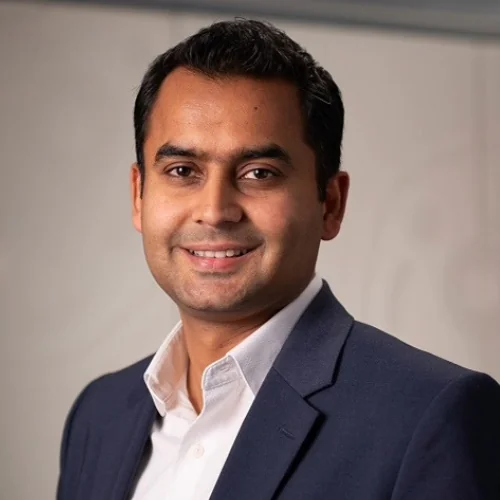
Growing up in Chandigarh, India, Mohit initially pursued mechanical engineering, following in his father’s footsteps. His early work fueled his fascination with cars and engines, but his interest in medicine and helping people eventually came full circle while pursuing an MBA at the Indian School of Business. It was during an on-campus recruitment event that Mohit first learned about AstraZeneca and was drawn to its global leadership program and commitment to developing its people. He saw an opportunity to help people live better, healthier lives, reconnecting with his childhood dream of becoming a doctor.
Now, with over ten years at AstraZeneca, Mohit has worked in Japan, Europe, and the US across various therapy areas. His contributions include shaping drug development strategies, managing product lifecycles, executing drug launches, advocating for market access, and working on national cancer care plans. Regardless of his role, Mohit remains focused on improving patient care and ensuring equitable healthcare.
Currently, Mohit leads the US commercial strategy for AstraZeneca’s oncology portfolio. He is passionate about developing the next generation of leaders, believing that a key indicator of a leader’s success is how many more leaders they can create. He collaborates closely with his team, taking a transformational and inclusive approach to decision-making. “It’s not my decision, it’s our decision. It’s not my view, it’s our view,” he says.
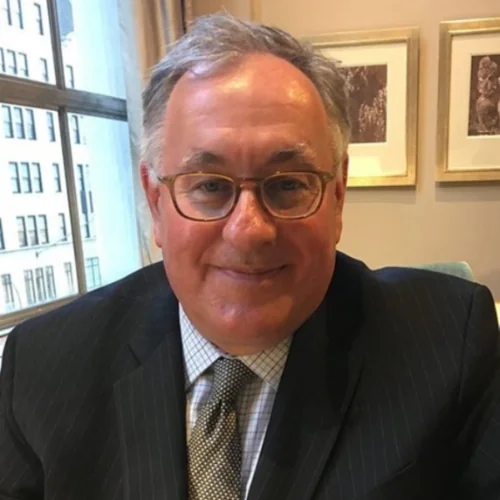
Dr. Alfred Slanetz is the founder, president, and chief executive officer of Geneius and has been since its incorporation. He also has served as a director on Geneius’s board since its incorporation in 2012. Geneius, an immuno-oncology start-up, is researching ways to help cancer patients’ immune systems detect and attack cancer cells. This new therapy is dubbed Targeted DiversiTy and when combined with surgery, it promises to change the difficult process or surgery, drugs and radiation that is the current standard
Between 2006 and 2011 Dr. Slanetz was President and CEO at Bluebird Bio. He served as President and CEO of Genetix Pharmaceuticals, Inc. He served as Vice President, Business Development of TRANSGENE in May 1996. From 1994 to 1996, he served as Manager, New Product Planning and Development at Genentech Inc. Prior to that, Dr. Slanetz was a Management Consultant for Arthur D. Little.
In 1993 Dr. Slanetz received his Ph.D. in Molecular and Immunobiology from Yale University. He earned his Master of Science in Biomedical Engineering from Brown University in 1986. He holds a Bachelor of Science in Biology from Hamilton College.
SPONSORSHIP OPPORTUNITES
Inquiries regarding sponsorship of our Global Summit and Award Ceremonies for Cancer Research & Entrepreneurship event can be made by e-mail at Sponsorship@nfcr.org or by phone at 1-800-321-CURE (2873). Learn more in our sponsorship packet.


